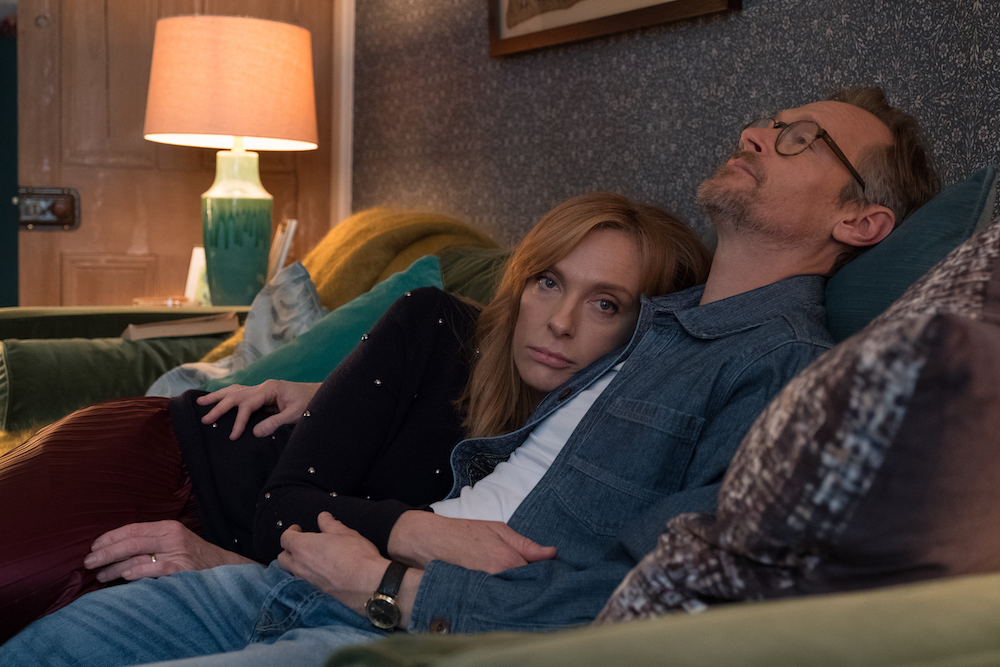There’s a conspiracy between the body and the mind to which our conscious selves are never party. Together, they make us cry when we feel nothing; they make us numb when we should want to scream and make us laugh at funerals; they kill our hunger or drive us to eat and eat and eat to suit our feelings; and they’re all mixed up together when it comes to the question of sex. Loss. Fear. Love. Anger. Lust. They’re all stewed in the same billycan, and together become the force that governs our choices, to us almost entirely unknown.
Not exactly the framework you’d expect for what seems like a charming British married people sex comedy, is it? Yet “Wanderlust,” like the human body, doesn’t often do the thing that you expect. The six-episode series from writer Nick Payne, a co-production between BBC One and Netflix, begins with a simple enough setup: Married couple Joy (Toni Collette) and Alan (Steven Mackintosh) love each other, but their sex life has positively cratered. She’s a therapist dealing with the aftermath of a brutal bike accident, he’s a teacher navigating some sticky situations at work (that’s an unfortunately on-point pun, as you’ll discover). Their problems with physical intimacy lead to a lack of intimacy of other kinds, and they begin to connect with others (Zawe Ashton as Claire, a fellow teacher; William Ash as Marvin, someone from Joy’s physical therapy class). It’s the kind of thing that could tank a marriage, but Joy proposes an unconventional solution, something to which Alan hesitantly agrees, then eagerly embraces.
There’s no need to be coy about it, really—they start having sex with other people, and talking about those experiences, and those two things change everything. Of the pleasures of “Wanderlust”—and there are many—the purest is watching Mackintosh and Collette dig into the many complexities that emerge from this premise. Playing what a person feels and does is one thing; playing the realization that one does not feel what one ought to feel, analyzing what that means, uncovering what’s behind it, and exploring what comes next is something else entirely. It’s a feast for an actor, of the sort that usually accompanies heavy, tragic material. There’s tragedy and heaviness in “Wanderlust,” but only rarely does the darkness reach such a pitch that there’s no light or humor to be found. As such, Mackintosh and Collette make their characters messy, engaging, and deliciously, undeniably human, giving two incredibly strong performances in a year of new shows that skip merrily across the emotional spectrum (see also: “Killing Eve,” “Barry,” “Forever,” “Vida,” “Cobra Kai,” “Succession,” etc.).

Performances like that are hard to come by, and Mackintosh and especially Collette are reason enough to give “Wanderlust” some of your time. But it’s rare to achieve such heights without some truly great writing, and “Wanderlust” has plenty of that. Payne’s willingness to let characters be full of contradictions, and to allow them to do cruel things while remaining worthy of sympathy, makes each scene more layered than it might seem at first glance. Joy’s a therapist, and has one of her own (Sophie Okonedo, excellent); all the discussion of psychology encourages viewers not only to acknowledge neuroses, but to ask why they exist, question their cause, and analyze the effect they might have on the lives of these characters. It doesn’t ask you to play armchair therapist, but it does encourage approaching the material as though it contains no easy answers—which, of course, it doesn’t. Relationships don’t, either.
As mentioned above, there’s plenty of lightness, and that quality makes getting swept up in “Wanderlust” all too easy. Yet the show’s highest highs are among its darkest moments, a reality acknowledged by its intimate, elegant, restrained direction (Luke Snellin and Lucy Tcherniak) and cinematography (Ben Wheeler). It’s beautiful, often warm, but somehow terribly lonely. The editing (Gary Dollner and Johnny Rayner), sharp and sometimes disorienting, contributes to that feel by lacing Joy’s more heightened moments with brief, at first unexplained flashes to her past: a woman in a crosswalk, a man on a rooftop, a van, a helmet, a black dress, a bouquet of flowers. What these mean are revealed in time, but what matters more is what they mean to Joy—and in a remarkable late-series two-hander between Collette and Okonedo, Tcherniak and her actors dive neck-deep into all that meaning without ever leaving their seats.
As the series goes on, the complexities mount, and so do the ambiguities and the questions with no easy answers, if any answers exist. That means “Wanderlust,” as good as it is, simply won’t be for everybody. Should you be unwilling to spend time with characters whose motivations and actions aren’t always easily explained or all that pleasant, Payne’s deep-dive into the brain and body’s means of dealing with grief and desire perhaps won’t be for you. But if that’s your kind of mess—the kind we all encounter from time to time—six excellent hours of television await.
Premieres Friday, October 19 on Netflix. Complete series watched for review.












